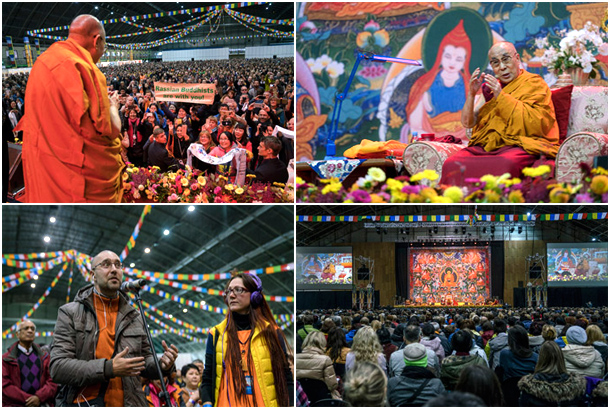 Riga, Latvia — Observing an understanding of selflessness, which is unique to Buddhist teachings, His Holiness the Dalai Lama said that unique enables us to reduce our exaggerated way of looking at things.
Riga, Latvia — Observing an understanding of selflessness, which is unique to Buddhist teachings, His Holiness the Dalai Lama said that unique enables us to reduce our exaggerated way of looking at things.
His Holiness the 14th Dalai Lama arrived in Riga, the capital of Latvia, to begin a two day teaching on October 10th. Organized by Save Tibet, His Holiness was greeted early Monday morning in Riga's Skonto Hall by an eager audience of 4500.
Over 3000 came from Russia, while roughly 500 were from Kalmykia, 300 from Buryatia and 100 from Tuva. The spiritual leader's teachings are being translated and webcast in English, Latvian, Estonian, Russian and Mongolian, as well as Tibetan.
"Here we are once again in Latvia," His Holiness began, "and I'd like to thank the organizers for creating this opportunity for me to give some explanation of Buddhist teachings. Not so long ago when I was here to give an introduction to Buddhism, a Russian told me how difficult it is for many of his compatriots to travel to India because of economic constraints. He told me it would be much easier for them to come to Latvia. I said I would look into it and was pleased to find my friends here supported the idea—so here we are and a huge number of people have come.
"The Buddha," His Holiness explained, "was born into a royal family, renounced that comfortable life and engaged in austerities for six years. Eventually he sat under the Bodhi tree near the Niranjana River and attained enlightenment. Although he pondered whether anyone else would understand what he had realised, he found his former companions in austerities and explained to them the Four Noble Truths. These constitute the first Turning of the Wheel of Dharma and form the basis of both the Pali and Sanskrit traditions of Buddhism.
"Also belonging to the Nalanda tradition, Dignaga and Dharmakirti wrote about logic and epistemology. The teaching we are going to go through today comes from Dharmakirti's 'Commentary on Dignaga's 'Compendium of Valid Cognition''. Since I had heard that in the early 20th century a Russian scholar Fyodor Shcherbatskoy translated some of Dharmakirti's works into Russian and English, when we were discussing what I should teach, we decided that the second chapter of Dharmakirti's classic work on Valid Cognition'' would be appropriate."
His Holiness observed that an understanding of selflessness, which is unique to Buddhist teachings, enables us to reduce our exaggerated way of looking at things. He reported that American psychiatrist Aaron Beck had told him something similar, that when we are angry or attached to something or someone, they appear wholly negative or wholly attractive. In fact, Beck declared, this is 90% mental projection.
So, reflecting on emptiness along with the awakening mind of bodhichitta is a source of peace of mind. His Holiness said that such inner peace fosters health, well-being and longevity. Moreover, he added, if we follow the approach of the sharp-witted and apply reason in our studies, the Buddhist tradition will survive a long time.
Breaking for lunch, His Holiness dined with 15 parliamentarians from the Baltic States: two from Estonia, three from Lithuania and ten from Latvia.
Resuming his teachings after lunch, His Holiness first invited questions from the audience. In answering them he explained how much he appreciates vegetarianism and how it is now widely observed in the common kitchens of Tibetan Monasteries in India, despite his own inability, for medical reasons, to be fully vegetarian.
Continuing his reading of the second chapter of 'Commentary on Dignaga's 'Compendium of Valid Cognition'' His Holiness touched on how the Buddha became a reliable guide, and how valid cognition, being an awareness that corresponds with reality, is undeceptive. His remarks also clarified that the substantial cause of consciousness must be consciousness.
He reiterated that in explaining dependent arising the Buddha taught us how to overcome distorted views. Such a wisdom is a powerful antidote to ignorance. Applying it we can remove ignorance from our mental continuums. Finally, he remarked that the Buddha did not teach about suffering to scare us, but to indicate reality, the possibility of its cessation by cultivating the path. He made clear that understanding the Four Noble Truths in the context of the Two Truths—conventional and ultimate truth—is the way to take refuge in the Three Jewels on the basis of reason.
His Holiness announced that in addition to continuing to read the text tomorrow he would offer the opportunity for members of the audience to generate the awakening mind of bodhichitta.


![Tibet has a rich history as a sovereign nation until the 1950s when it was invaded by China. [Photo: File]](/images/stories/Pics-2024/March/Tibet-Nation-1940s.jpg#joomlaImage://local-images/stories/Pics-2024/March/Tibet-Nation-1940s.jpg?width=1489&height=878)















